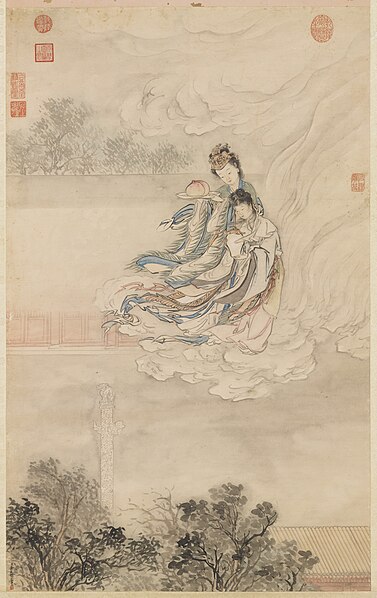A xian is any manner of immortal, mythical being within the Taoist pantheon or Chinese folklore. Xian has often been translated into English as "immortal".
"The Eight Immortals Crossing the Sea"
Immortal riding a Dragon, by Ma Yuan.
Xian as depicted on Eighty-seven Immortals (八十七神仙), popularly attributed to Tang dynasty painter Wu Daozi, currently housed in Xu Beihong Memorial Hall in Beijing.
Xiwangmu descends from heavens with a Peach of Immortality (Jade Pond Birthday greeting, by Jin Tingbiao, Qing dynasty
Taoism or Daoism is a diverse tradition indigenous to China, variously characterized as both a philosophy and a religion. Taoism emphasizes living in harmony with the Tao—generally understood as being the impersonal, enigmatic process of transformation ultimately underlying reality. The concept originates in the Chinese word 道, which has numerous related meanings: possible English translations include 'way', 'road', and 'technique'. Taoist thought has informed the development of various practices within the Taoist tradition and beyond, including forms of meditation, astrology, qigong, feng shui, and internal alchemy. A common goal of Taoist practice is self-cultivation resulting in a deeper appreciation of the Tao, and thus a more harmonious existence. There are different formulations of Taoist ethics, but there is generally emphasis on virtues such as effortless action, naturalness or spontaneity, simplicity, and the three treasures of compassion, frugality, and humility. Many Taoist terms lack simple definitions and have been translated in several different ways.

Laozi Riding an Ox by Zhang Lu (c. 1464–1538)
Illustration of "The Debate on the Joy of Fish" from the Zhuangzi
Han dynasty Chinese talisman, part of the Wucheng Bamboo-slips [zh]
Zhang Daoling, the first Celestial Master







![Han dynasty Chinese talisman, part of the Wucheng Bamboo-slips [zh]](https://upload.wikimedia.org/wikipedia/commons/thumb/8/8d/Chinese_Fulu_talisman_han_dynasty_%E4%B9%8C%E7%A8%8B%E6%B1%89%E7%AE%80%E6%B5%99%E6%B1%9F%E5%87%BA%E5%9C%9F.jpg/441px-Chinese_Fulu_talisman_han_dynasty_%E4%B9%8C%E7%A8%8B%E6%B1%89%E7%AE%80%E6%B5%99%E6%B1%9F%E5%87%BA%E5%9C%9F.jpg)
